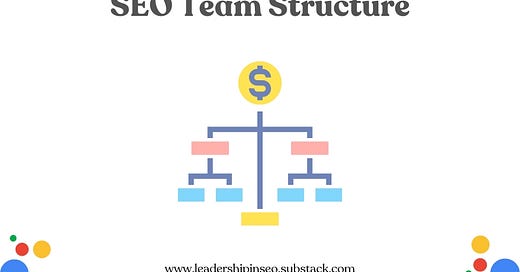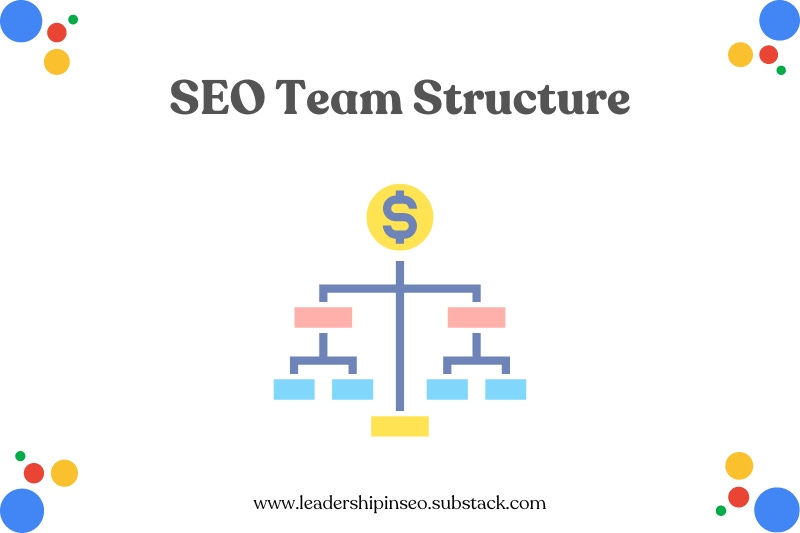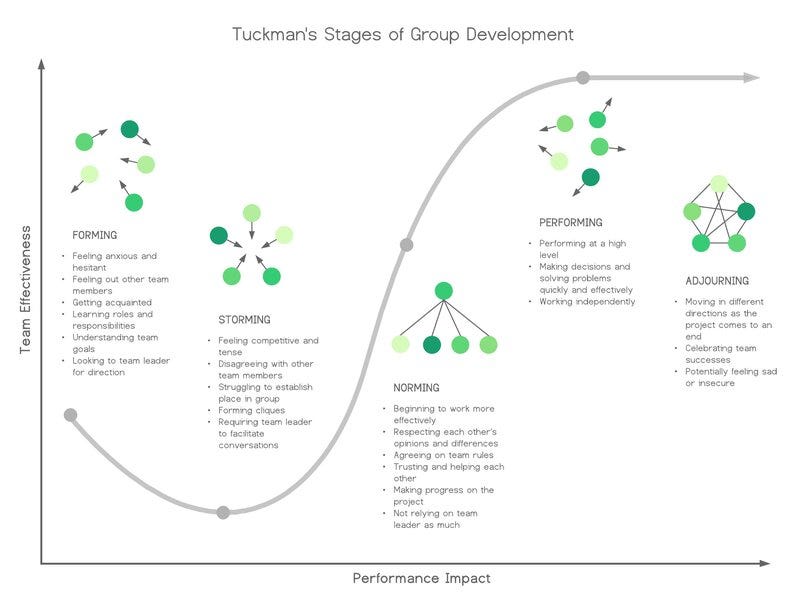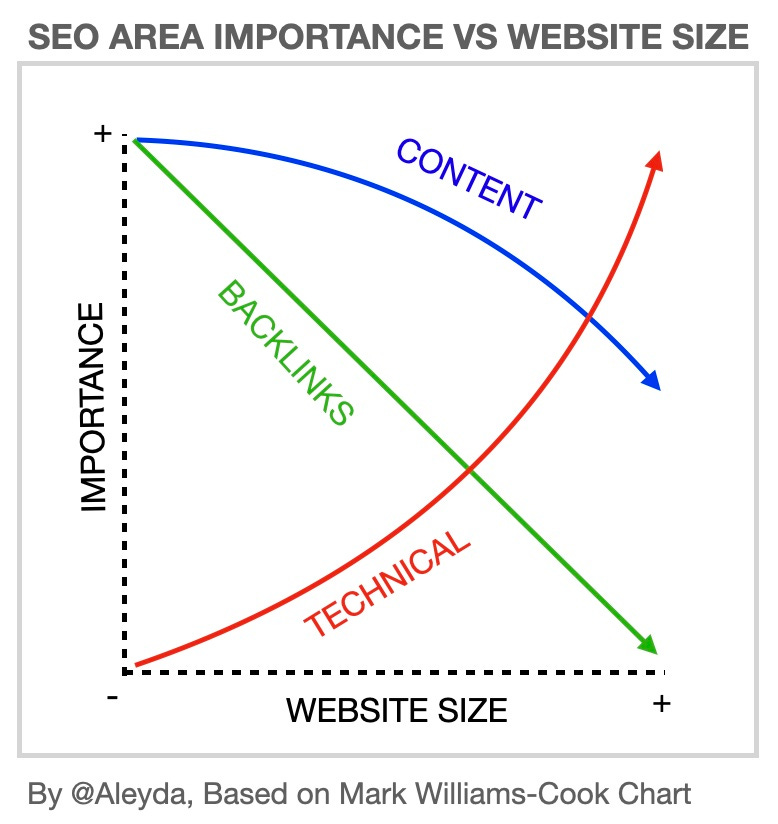How to structure SEO teams
The set up of your SEO team must directly reflect the company's goals, maturity and available resources in order to be successful
TL;DR
The maturity of a company, the size of the website and business goals must be foundational principles when setting up your SEO team
Tech resource is at a premium everywhere, if you decide to set up a tech SEO department, make sure your work can be implemented
The value of SEO is different everywhere. Don’t get despondent if you aren’t considered ‘business-critical.’ Earn it.
How important is the makeup of an SEO team?
This may be a personal opinion, but I think that the makeup of any team is likely to be the difference between true success and failure. Whilst hiring good people is the most important thing you can do as a leader, you have to put them in a position that will allow them to be successful.
That means opening the right doors at the right time, making the relevant introductions and letting good people spread their wings in a structure that facilitates high-quality work is everything when it comes to leading a team.
The Power of Documentation in SEO
TL;DR You should always aim to leave any role and any job in a better position than you found it in. Documentation is a fantastic way of doing so
What matters when setting up an SEO team?
Now, there are some factors you need to consider before starting to build out a team structure;
Company goals
Having worked for digital marketing agencies, affiliate marketing and lead generation websites, e-commerce companies and large-scale publishers the main commonality is - you’ve guessed it - revenue. Everybody needs to hit their targets and your job is not only to optimise the website and make other teams and their content shine. Your job is to generate revenue for the company.
The size of the SEO team
The larger the team, the more important structure, management and communication are. Both internally and externally. As a rough rule of thumb, teams of under six or so can afford to be jack of all trades. Whereas larger teams of 10 plus may require specialists, clearer job descriptions and reporting lines. From personal experience, I would say that specificity breeds success; or something as equally beige.
Stage of team development
If we use Tuckman’s Stages of Group Development as a starting point, you should be able to evaluate where your team is currently and what you will probably need to go through to reach your goal.
Take this with a pinch of salt, but it’s useful to break a team’s development down into some clear stages;
Forming
Storming
Norming
Performing
Adjourning
In the forming stage, your team will be eager, questioning and getting to grips with how things currently work. As it moves into the storming stage you’ll notice some conflict and bubbling emotions, which will help you understand the individuals more effectively. The norming stage will be some welcome relief as the team finds their way and working patterns, before finally moving into the performing and adjourning stage.
Understanding where you are now is key to understanding the type of skills and, more importantly, the type of personalities you will need to succeed.
Maturity of the company
More mature companies have more stringent processes you have to follow and having a group of SEOs going rogue doesn’t tend to suit more mature businesses. Mature companies, with larger, more complex websites are going to have infinitely different requirements to a startup. More often than not, I find that pureplay SEO is a pretty poor investment for a startup outside of link building and digital PR.
Aleyda Solis’s simple illustration is an excellent way of determining where you should probably spend your time as SEO’s. The larger and more mature the site, the less prominence backlink acquisition will have and the more powerful technical SEO will likely be. Having just started building out a proper technical SEO function at The Telegraph (a website with millions of pages and hundreds of articles created each day), I agree with the overall sentiment.
However, I would question whether the content line of importance would drop anywhere near as steeply, if at all.
Resource
Logically you want to focus your team’s time where it’s going to have the biggest impact. If you work for a large site that is light on content creators and heavy on developers and product managers, you might want to consider investing in technical SEO.
Conversely, if you work for a company that is light on tech resource, a genuinely good technical SEO is going to be frustrated when their work won’t be implemented. The point here is even if you know that you need someone with experience using log files, information architecture, Javascript and the like, you need to hire them at the right time.
Importance of SEO to the company
As SEO’s, it may surprise you that not everyone is enamoured by search engine optimisation. You may not even be considered fundamental to the success of the company. Rightly or wrongly, these are parameters you need to work around.
So, what are my options?
Classically, most people break SEO up into three core functions: technical SEO, on-page SEO and off-page SEO. But that doesn’t mean you are obligated to follow this tried and tested path. You need to set up an SEO team that suits the needs of the business. You absolutely can (and in some cases should) be a little more creative, but the primary focus should be what is going to make the delivery of valuable, revenue-driving work simple and effective.
Key questions to ask before making any decisions
What industry is the company in?
Does the company have adequate tech resource and proper processes in place?
What is the size of the website?
How many articles are published over a certain period?
Do you have an SEO agency?
How much budget and headcount do you have to play with?
How easy/difficult is it to implement changes or improvements?
Case Studies
Here are a few examples of SEO team structures that are likely to be more effective based on a company’s goals, maturity and resources.
#1 - A large-scale publisher
Company goals: traffic, advertising/affiliate revenue and subscriptions
Website size: 1,000,000 pages +
Maturity: established company
Tech resource: medium, but spread thinly
In this scenario, this high-volume, mature publisher has reasonable tech resource spread across many, many departments and initiatives. Typically these legacy sites have dozens of high-value initiatives (hint: content quality, deadweight pages and duplicate content from parameter URLs are generally good places to start) that require specific news SEO heads, a technical SEO leader (or team) and - depending on their evergreen content plans - some traditional SEOs.
The only time I would consider hiring a digital PR or off-site SEO(s) is if the company were launching new products or, potentially, in a new country. This is likely to be a little alien to senior editorial staff, so pitch it wisely.
SEO reporting and tool stacks for publishers
TL;DR Your business goals should define your reporting. As an SEO, your reports should still be ‘revenue’ first.
#2 - A start-up
Company goals: awareness and sales
Website size: 50 pages +
Maturity: brand new
Tech resource: low
A start-up tends to be fairly simple from an SEO POV. If you agree that the company would benefit from SEO resource (and it is a two-way street), then the only sensible options are to invest in a traditional all-around SEO who can deliver high-quality evergreen content plans (and has some basic knowledge of whether or not there are any critical tech issues) and/or a digital PR head of off-site SEO specialist who can improve your brand awareness.
#3 - An e-commerce client
Company goals: product sales and email signups
Website size: 500,000 pages +
Maturity: 10 year
Tech resource: medium, but focused
E-commerce companies tend to be some of the most interesting and time-consuming to work on SEO-wise. The mixture of optimising product pages, information architecture, internal linking, site speed and faceted navigation (amongst other things) should be a high-quality SEOs bread and butter. But, particularly on larger e-commerce stores, the technical SEO requirements tend to mean a technical SEO head is essential.
On top of that, I would try to have some traditional SEO Managers and - if part of the company’s requirements is to improve its brand awareness - a digital PR headcount who knows how to run campaigns can make a huge difference.
One of the best pieces of advice I can give is to try and frame the work you do within SEO to align with clear company goals. Are they looking to improve brand awareness? Pitch in some off-site SEO specialists. Do they want to grow traffic sustainably? Hire someone with a clear focus on evergreen content, product pages and/or news. Although news SEO is definitely different to evergreen, so be astute, clear and concise.









